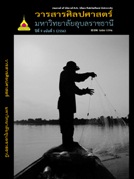Heritage Hotels and the Question of Authenticity
Main Article Content
บทคัดย่อ
Culturally savvy tourists are one of the traveller groups whoprefer to stay in the hotels that are able to distinctively provideindividual experiences that they cannot find anywhere else. Usingheritage buildings as fabric then applying adaptive and re-use concepts as a boutique hotel is one of the alternatives to both serve the demand of this traveller group and preserve the heritage in Thailand simultaneously. The aim of this dissertation has been to survey and find potential heritage buildings for applying adaptive and re-use concepts, to identify the constraints relating to the legal, financial and cultural factors that militate against such practices of re-cycling, and to find a feasible way and key success factors to run a boutique hotel in heritage buildings under the constraints of cultural, legal, and economic realities in Thailand. The study was based on interviews and survey of selected buildings categorized into three types of heritage hotels: Original Heritage Hotels, Heritage Hotels that apply an adaptive and re-use approach and Nostalgic Heritage Hotels. There are also two additional hybrid categories situated between these categories. The study also provided a discussion on the question of authenticity of the heritage hotel through a case study of Nan Fa hotel vs. Rachamankha hotel – the interrelated categories of ‘Originally built as a hotel’ and ‘Re-use of Historic Building as Fabric’ vs. ‘Nostalgic Heritage Hotel’. The surveys were conducted during September 2009 to May 2012. It was found that to apply adaptive and re-use programs to heritage buildings is not a straightforward approach that can be applied in every case. Rather, an analysis of the economic, social and cultural conditions is an inescapable pre-requisite. There are also financial, legal and time constraints. If we are to find solutions to overcome these, then we may find a way to run a successful boutique hotel business to serve the current trend of tourists who demand to find a place that provides what they see as ‘authentic’ experiences to them. Those types of tourists will not tend to negotiate but are willing to pay a ‘premium’ if the boutique hotel can provide services that are beyond their expectations. Furthermore, a study of the question of ‘authentic’ design to underlie the creation of ‘architectural excellence’ in the adaptive re-use of heritage buildings requires much further commitment in Thailand in the future.
คำถามว่าด้วยความแท้จริงของเฮอร์ริเทจโฮเต็ล
ในบรรดานักท่องเที่ยวประเภทต่างๆ นักท่องเที่ยวที่เดินทางเพื่อศึกษาศิลปวัฒนธรรมความเป็นอยู่ของคนในแหล่งท่องเที่ยว (Culturally savvytourists) คือกลุ่มนักท่องเที่ยวที่มีความพึงใจในการเลือกพักในโรงแรมที่สามารถเสริมสร้างประสบการณ์ใหม่ๆ ไม่เหมือนใคร (individual experiences) ดังนั้นการสร้างโรงแรมโดยการปรับเปลี่ยนอาคารเก่าแก่และมีคุณค่าควรแก่การอนุรักษ์ภายใต้แนวคิดเพื่อการพาณิชย์ อาทิ การปรับเปลี่ยนเป็นบูติคโฮเต็ล (BoutiqueHotel) ก็เป็นอีกทางเลือกหนึ่งที่นอกจากจะช่วยเติมเต็มอุปสงค์ของนักท่องเที่ยวกลุ่มดังกล่าวได้ อีกทั้งยังเป็นการอนุรักษ์มรดกทางวัฒนธรรมในประเทศไทยไปในตัวอีกทางหนึ่งด้วยงานวิจัยนี้มีเป้าหมายคือการสำรวจและค้นหาอาคารที่มีคุณค่าควรแก่การอนุรักษ์และมีศักยภาพในการปรับเปลี่ยนเป็นบูติคโฮเต็ล เพื่อค้นหาข้อจำกัดหรือข้อบังคับที่เกี่ยวข้องกับกฎหมาย, การเงิน, และปัจจัยทางด้านวัฒนธรรมต่างๆ ที่เกิดขึ้นกับกรณีศึกษาของการปรับเปลี่ยนอาคารดังกล่าว รวมไปถึงการค้นหาปัจจัยแห่งความสำเร็จของการแข่งขัน (Key Success Factors) ในการบริหารและจัดการบูติคโฮเต็ลในประเทศไทยภายใต้ข้อจำกัดที่ได้กล่าวไว้ข้างต้นการศึกษาครั้งนี้กระทำโดยการสัมภาษณ์และสำรวจเฮอร์ริเทจโฮเต็ล (HeritageHotels) ที่ได้ถูกคัดเลือกและได้รับการจัดแบ่งเป็น 3 ประเภท ดังนี้ 1) โรงแรมที่ถูกสร้างขึ้นในอดีตและมีประวัติศาสตร์อันยาวนานและมีคุณค่าในการอนุรักษ์(Original Heritage Hotels) 2) โรงแรมที่เกิดจากการปรับเปลี่ยนจากอาคารเก่าที่มีคุณค่าแก่การอนุรักษ์เพื่อเป็นบูติคโฮเต็ล (Heritage Hotels that apply andadaptive and re-use approach) และ 3) โรงแรมที่สร้างใหม่โดยอิงการออกแบบของอาคารเก่า (Nostalgic Heritage Hotels) นอกจากนี้ในการศึกษายังพบว่า มีโรงแรมอีกสองประเภทที่คาบเกี่ยวกับโรงแรม 3 ประเภทข้างต้น ซึ่งจะขอเรียกว่าประเภทลูกผสม (hybrid categories)นอกจากนี้งานวิจัยยังได้นำเสนอบทสนทนาว่าด้วย “คำถามว่าด้วยความแท้จริง (Authenticity) ของเฮอร์ริเทจโฮเต็ล” ผ่านกรณีศึกษาของโรงแรมน่านฟ้าและโรงแรมราชมรรคา – ทั้งสองโรงแรมอยู่ในประเภทโรงแรมแบบลูกผสมระหว่างประเภท 1 และ 2 กับ แบบลูกผสมระหว่างประเภท 2 และ 3 ตามลำดับ ขอบเขตของการวิจัยอยู่ในช่วงเวลาระหว่างเดือนกันยายน พ.ศ. 2552 ถึงเดือนพฤษภาคม พ.ศ. 2555 จากการศึกษาพบว่าการปรับเปลี่ยนอาคารควรค่าแก่การอนุรักษ์เพื่อเป็นบูติคโฮเต็ลนั้นไม่ใช่วิธีที่ตรงไปตรงมาและสามารถกระทำได้ในทุกกรณี เนื่องจากเราจำเป็นต้องคำนึงถึงปัจจัยแวดล้อมทางด้านเศรษฐกิจสังคม และวัฒนธรรมเป็นจุดตั้งต้นก่อนเริ่มทำการอนุรักษ์อาคารแต่ละแห่ง ยิ่งไปกว่านั้นปัจจัยทางด้านการเงิน, กฎหมาย, และเวลาในการอนุรักษ์ก็เป็นสิ่งที่ขาดเสียมิได้ในการวิเคราะห์และศึกษาอาคารทุกแห่ง หากเราสามารถค้นพบวิธีที่จะก้าวผ่านปัจจัยและเอาชนะข้อจำกัดดังกล่าวข้างต้นได้สำเร็จ ย่อมหมายถึงเรามีความเข้าใจเพียงพอที่จะสามารถบริหารบูติคโฮเต็ลที่อาศัยอาคารที่ควรคุณค่าแก่การอนุรักษ์เป็นจุดขาย เพื่อรองรับอุปสงค์ของนักท่องเที่ยวในยุคปัจจุบันที่นิยมแสวงหาสถานที่ที่สามารถนำ เสนอประสบการณ์ที่แท้จริง (authenticexperiences) ได้สำเร็จ หากนักท่องเที่ยวทุกคนได้รับการบริการที่เหนือความคาดหมายควบคู่กันไปด้วย พวกเขาย่อมเต็มใจที่จะจ่ายเงินในจำนวนที่มากขึ้น(premium) แลกกับประสบการณ์ที่ไม่เหมือนใครตามไปด้วย ท้ายที่สุดบทวิจัยนี้ได้บุกเบิกพื้นที่วิจัยสำหรับการศึกษาในอนาคตไว้ด้วย กล่าวคือ การออกแบบเพื่อสร้างบูติคโฮเต็ลประเภทใดก็ตาม การออกแบบโดยคำนึงถึงเนื้อแท้ (‘authentic’design) จะเป็นรากฐานสำคัญที่จะนำไปสู่การออกแบบทางสถาปัตยกรรมที่ยอดเยี่ยม (‘architectural excellence’) สำหรับอาคารควรค่าแก่การอนุรักษ์เพื่อเป็นบูติคโฮเต็ล เพื่อการพัฒนาที่ยั่งยืนสืบต่อไป


